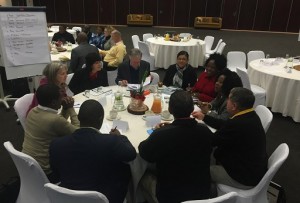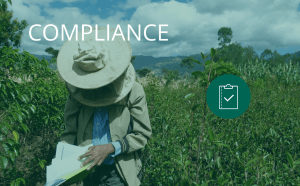NATURAL INGREDIENTS SECTOR DEVELOPMENT
IN SOUTH AFRICA
All on-board to enable natural ingredients business
Within the scope of CBI’s natural ingredients programme in South Africa, ProFound worked with a wide range of stakeholders. Together with ministries, companies, business associations and universities in South Africa we developed an export strategy for natural ingredients. This strategy creates an enabling environment for companies to do business and export.
The implementation of the Nagoya Protocol in South Africa is a key issue in this strategy. This requires improved coordination between companies and relevant ministries to simplify implementation mechanisms. Ministries also need to provide simple tools and resources to help the private sector in South Africa and Europe to understand and comply.
This will make it easier for local companies to develop and market products based on traditional use and bring them to the market. With the benefits for rural communities.
“On our request, ProFound identified and activated relevant stakeholders in the natural ingredients sector in South Africa: ministries of trade and industry, environment, science and technology, and private sector stakeholders such as companies and associations. ProFound’s experience and capabilities in bringing them together through strategic conferences resulted in a common understanding of what the sector needs to export to Europe and develop a vision on how to get there.“
– Dirk-Jan Zegelaar (CBI Programme Manager South Africa)
Our activities to develop a strategy for the natural ingredients sector in South Africa is part of our compliance solution and market entry solution. We:
- Identified relevant stakeholders, including companies, industry associations, ministries and government agencies, service providers, financial institutions and universities.
- Organised sector conferences in South Africa to bring together stakeholders. During these conferences, stakeholders identified and prioritised issues and developed solutions.
- Developed a joint strategy with stakeholders for the natural ingredients sector in South Africa, with key actions, responsibilities and timeline.
Exports of natural ingredients benefits local communities in South Africa
European buyers and consumers are always looking for exciting new products and ingredients. Often looking at traditional uses of plants or local biodiversity. With its unique local biodiversity, South Africa is a great source of inspiration for the natural ingredients sector. For example, with marula oil, traditionally used by Tsonga women, or baobab powder, from the ‘Tree of Life’.
Bringing new ingredients with inspiring stories to the market can bring strong benefits to South Africa. Suppliers marketing these ingredients in Europe are not the only ones to profit from market access. Benefits are channelled through the chain. Export impacts the livelihoods of processing plant workers and communities supplying raw materials. These are often from remote rural areas with few other income generating opportunities.
“ProFound helped me understand what natural ingredients companies need in order to do business and how this relates to access and benefit sharing. I can use this in my work to create a better business enabling environment. ProFound has connected me to the right stakeholders in the sector to do so.”
– Preshantie Naicker-Manick (Department of Environmental Affairs South Africa)
Negotiating access to community knowledge
Unfortunately, there are still very few South African products on international markets. This is partly because it is difficult to bring a new natural ingredient to the international market if it is based on traditional knowledge or natural resources. The Nagoya Protocol on Access and Benefit Sharing (ABS), signed by both South Africa and the European Union, helps to overcome such barriers. It provides guidelines for accessing and using genetic resources and traditional knowledge. And it requires that benefits are shared with communities that developed this traditional knowledge.
ABS could bring additional income for communities. However, its implementation in South Africa makes it difficult for companies to comply. As a result, this creates a hurdle for communities to get any benefits from sales of the product.
“There has never been a more challenging time to take a natural product to market. I believe that ABS is the future of ‘fair trade’ and that ‘fair trade certifications’ will become irrelevant as ABS gains understanding and momentum around the world. ProFound has offered me a platform to share my experiences with becoming ABS compliant. My experiences can help other stakeholders to develop policies which enable entrepreneurs to do business. And it is these businesses that we need to offer a better future to rural communities in South Africa.”
– Sarah Venter (Founder of Ecoproducts)
ProFound Solutions for this story

A baobab fruit at a european trade fair.

Sector meeting in South Africa.

The iconic South African baobab tree.



